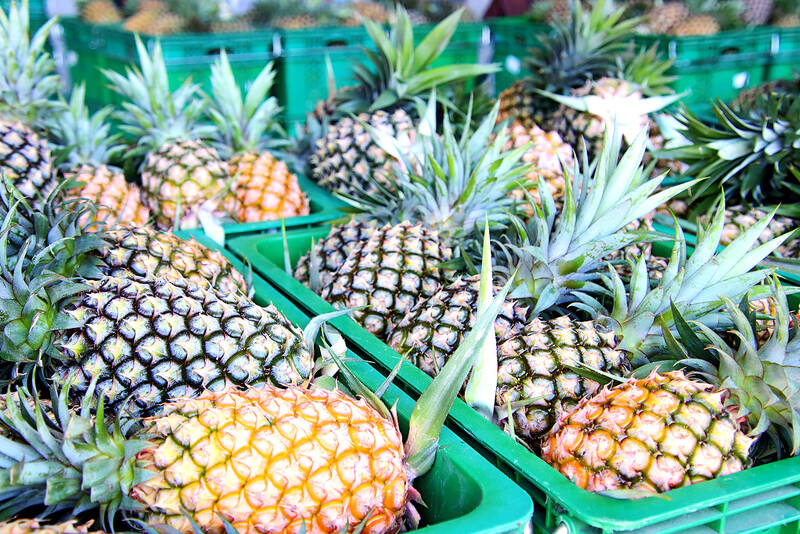A: What types of fruit enzymes should we take to help reduce eye floaters?
B: According to a study published in the “Applied Sciences” journal by Taiwanese ophthalmologist Horng Chi-ting, pineapple, papaya and fig supplements can improve symptoms.
A: Pineapples are in season now, so you should munch on more of those to get rid of floaters.

Photo: Liberty Times 照片:自由時報
B: Not quite. Enzymes can be damaged by our stomach acid if we eat the fruit directly. The doctor says taking fruit enzyme capsules is better for absorption.
A: Most importantly, we should reduce our use of personal electronics to prevent floaters from appearing.
A: 要補充哪些水果酵素,才有助改善「飛蚊症」啊?
B: 洪啟庭醫師發表於《應用科學》期刊的研究指出,鳳梨、木瓜、無花果等水果酵素都有助減輕症狀。
A: 現在正是鳳梨盛產期,你快狂吃把蚊子趕走。
B: 不行啦,直接吃水果酵素會被胃酸破壞。醫生說要吃酵素膠囊,才更有利吸收。
A: 最重要的還是少用3C產品,以預防飛蚊盯上你吧!
(By Eddy Chang, Taipei Times/台北時報張迪)

A: In your view, what are Taipei’s top buffet restaurants? B: Feastogether Group’s outlets — A Joy, Inparadise, Eatogether, Sunrise and Fruitful Food — are the runners-up. A: A Joy’s deluxe meal, priced at NT$3,880 per person plus a 10-percent service charge, is the most expensive of its kind. B: My No. 1 goes to Hi-Lai Group’s outlets — including Island and Hi-Lai Harbour. A: I feel like I’ve gained 3 kilograms just from hearing all the options. A: 你心目中最強的吃到飽餐廳是? B: 亞軍是饗賓集團的吃到飽品牌︰饗、饗饗、饗食天堂、旭集、果然匯。 A: 饗每人高達3,880台幣加一成,是全台最貴的吃到飽! B: 冠軍則是漢來集團旗下的品牌︰島語、漢來海港。 A: 哈聽到這麼多吃到飽,我感覺又胖了3公斤。 (By Eddy Chang, Taipei Times/台北時報張迪)

As summer approaches, people everywhere start enjoying frozen treats, especially the increasingly popular “gelato.” This Italian-style ice cream features vibrant colors and intense flavors. Made primarily with milk and often featuring seasonal fruits, gelato has a lower fat content of 4–8 percent compared with ice cream’s 10–14 percent. These ingredients ensure each spoonful is fresh and flavorful. The magic of gelato also lies in its texture and density. Unlike ice cream, which is stirred faster and harder, gelato is blended slowly by craftsmen. This process introduces less air into the mix, thus creating a creamy texture that is denser and smoother

★ Bilingual Story is a fictionalized account. 雙語故事部分內容純屬虛構。 Uneasy voices started to ripple through the lines of anxious students outside the school gate. “No signal?” “VPN’s down too.” “Wait — is this a cyberattack?” Nothing loaded on Jun’s phone either. Not his AI tutor, Echo. Not any app. Not even the Internet. Jun stood shoulder to shoulder with hundreds of other students outside the school gate. It was national exam day and the early July air was thick with heat and now charged with anxiety. The scene of everyone’s head hunched over their phones, cramming vocab,

A: In recent years, all-you-can-eat buffet restaurants have become the highest growing dining sector. What are some of the best buffets in Taipei? B: In my opinion, No. 10 to No. 7 are: Renaissance Taipei Shihlin Hotel’s Shihlin Kitchen, Denwell Group’s Feng Food, Grand Mayfull Hotel Taipei’s Palette and Shin Yeh Group’s Nagomi. A: The all-you-can-eat Japanese Wagyu beef at Shihlin Kitchen is superb. B: No. 6 to No. 3 are the “Big Four:” Sheraton Grand Taipei Hotel’s Kitchen 12, Grand Hyatt Taipei’s The Cafe, Regent Taipei’s Brasserie and Le Meridien Taipei’s Discovery Kitchen. A: Wow, all four